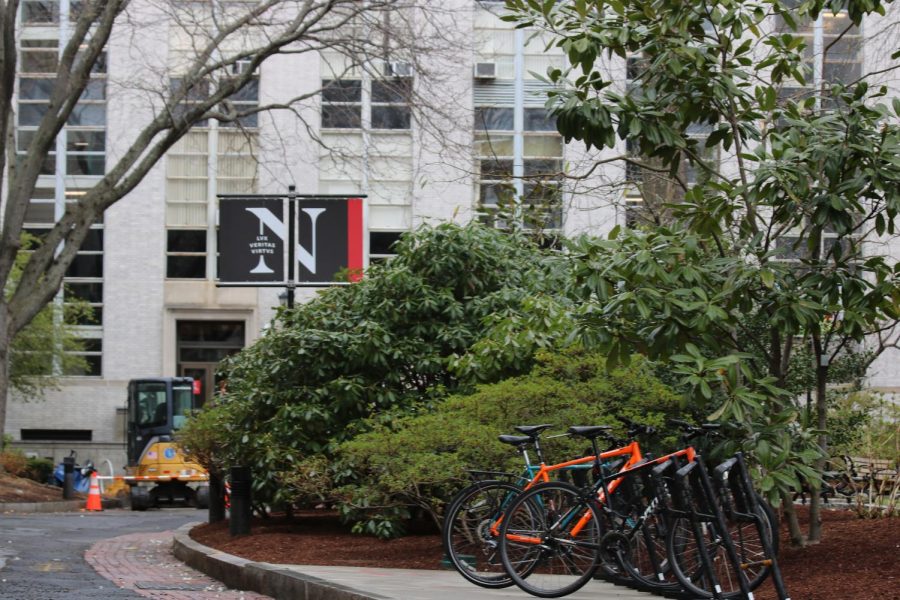Column: The NU community should adopt the Sunrise Northeastern Green New Deal
Northeastern must become a national leader in campus sustainability.
April 14, 2021
You may have heard about the Sunrise Movement, a progressive youth movement made up of students, faculty and community organizations. The movement spread across U.S. college campuses to make climate change an urgent, national priority. The Northeastern chapter is pushing for a new climate justice plan that considers not only those on campus but also those in the neighborhoods surrounding us — the Sunrise Northeastern Green New Deal, or GNEUD, which focuses specifically on making the administration’s decisions about sustainability more transparent to the community.
Every five to 10 years, Northeastern publishes its sustainable action plan to the public. The last plan, published in 2010, was a roadmap toward the university achieving carbon neutrality. It was a comprehensive summary that touched on renewable energy generation, green buildings, transportation, recycling and sustainability. The plan called for upgrading energy management systems and replacing existing electric motors with premium efficiency models.
It was prepared by influential and key professors at Northeastern, like Susan Powers-Lee and Carol Roskam, the Sustainability Program manager. Although this plan provided a strong blueprint toward how the university can achieve carbon neutrality, students and faculty felt as though the plan did not provide for campus-wide involvement. A broader perspective from students and other faculty at large might have led to the development of smaller projects that were more achievable by individual students and would have created an all-encompassing campus-wide initiative toward sustainability.
Northeastern is about to publish its next action plan, and Sunrise NEU is “on it.” Sunrise NEU wants a people-focused plan that implements justice-oriented climate principles. This approach is not just about becoming carbon neutral, but it is also about community-based action and environmental justice that was largely ignored in the previous plan. The grounding principles include environmental justice, community-based action, transparency and solidarity.
This semester, the environmentalist community at Northeastern has grown tremendously. With the introduction of Canopy, a coalition of environmental groups at Northeastern, the exchange of communication and the push for transparency are broader than ever. Canopy contains many different environmental clubs as its members, including the Student Government Association, Sustainability Board, the Husky Environmental Action Team, Cruelty-Free Northeastern and Sunrise Movement. The goal of Canopy is to get these clubs talking and working together to achieve each club’s individual projects faster with the help and participation of more people. This coalition is a perfect setup for a Sunrise GNEUD — it has made it easier to spread the word of the club and get entire clubs on board with the plan.
Despite the blossoming network of environmental clubs, a Sunrise GNEUD should not rely solely on environmental activists at Northeastern. Northeastern environmental activists have always pushed for participation by any student who wants to be involved. This deal will require work from the entire campus to get passed, including students and faculty who do not attend weekly sustainability meetings and those who might not know about the GNEUD. We must encourage everyone to get involved with sustainability and work proactively to make their campus greener.
There is no reason not to support the GNEUD. The deal is not trying to pass stricter “laws’’ enforcing fewer carbon emissions or trying to restrict an individual in any way. Rather, this GNEUD creates a foundation of trust and transparency between the administration and its students to make it clear that the goal of the plan is to cover gaps in the Northeastern Sustainability Plan. In doing so, we can ensure that the plan will successfully benefit us all.
Maeve Singer is a first-year computer science and environmental science combined major. She can be reached at singer.ma@northeastern.edu.
*An earlier version of the online article mistakenly identified Carol Rosskam as the Sustainability Program director; her correct position is the Sustainability Program manager. The online article has been updated to accurately reflect her title. The former Senior Sustainability Director was the late Jerry Ziola.







